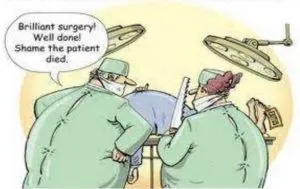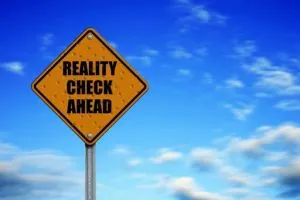The surgery was a success but the patient died
Are the side-effects of our “cure” for the covid-19 virus worse than the disease itself?

There are some remedies worse than the disease. – Publius Syrus, Roman writer, 50 BC
Our response to the Covid-19 virus is a choice: the frying or the fryer.
Our Age, like all Ages, has its unique contradictions that have helped us rise to the pinnacles of success, but which also have set in motion our inevitable death and decline. Here are a few historical anecdotes to make the point that all societies face calamities such as the Covid-19 virus which sometimes result in the collapse of that society yet for other societies inflict horrible damage that actually strengthen that society. My question is really this: which society are we? Will this crises permanently weaken us, or will it be a “blip” that spurs us to change in ways that will make us a more vibrant society?
This short essay examines the uncomfortable reality that the unintended consequences of “fighting” the covid-19 virus are also extremely damaging and will also result in the deaths of many innocent people. I find this an extremely painful realization. To be clear, these words are NOT a proposal for allowing people to die, but rather a consideration of the human condition so well described in the dying days of the Roman Empire in the book “The Consolation of Philosophy” by Boethius, who was wrongfully imprisoned and then sentenced to death. He wrote:
“If I have fully diagnosed the cause and nature of your condition, you are wasting away in pining and longing for your former good fortune. It is the loss of this which, as your imagination works upon you, has so corrupted your mind. I know the many disguises of that monster, Fortune, and the extent to which she seduces with friendship the very people she is striving to cheat, until she overwhelms them with unbearable grief at the suddenness of her desertion”
First, let’s set the stage. We all know, deep down in our souls, that life is harsh. That to live is to die. That sorrow follows inevitably after great joy just as rain follows a day of sunshine. These contrasts and contradictions are the essence of life itself. But our current society does its best to deny this harsh beauty. We cocoon ourselves in comfort and denial to avoid facing this harsh truth.
Unfortunately for us, we are not gods and still subject to the natural rises and falls of fickle Fortune so well examined by Boethius.

Boethius’s conversation with “philosophy” focuses on the role of one of the fates, the goddess of fortune – both good and bad. She is pictured above. Her horn of plenty can bring good luck, in the form of money, but notice that her eyes are covered. This symbolizes that your ‘good fortune’ is not always because you deserve it, you just happened to be at the right place at the right time. Conversely, as happened with Boethius, he happened to be at the wrong place at the wrong time: in charge of running Rome just as the new barbarians took over. Often she is pictured with a ball to represent the unsteadiness of fortune–unsteady and capable of rolling in any direction. It is our lot in life to be subject to this random good and bad fortune.
You are wrong if you think Fortune has changed toward you. Change is her normal behavior, her true nature. Boethius, living just after the fall of Rome
Now in historical terms terrible events like the covid-19 virus have appeared as plagues time and time again. What is interesting to note is that sometimes the terrible deaths from these plagues have completely shattered societies but at other times they have not. One of my favourite historians Hugh Trevor-Roper, in his book “The Rise of Christian Europe” explains why the Black death of the 14th century destroyed feudalism yet had minimal socio-economic impact in 17th century England:
“The same causes do not necessarily produce the same results in history. The results may even be opposite. What causes the general decline in 14th century Europe? It was not only the Black Death. Population had already started to decline before the plague. The abandonment of villages beyond the Elbe had also begun before the Black Death, so had the agrarian and urban discontent in the West. In general a healthy society soon recovers from decimation by an epidemic. London would shrug off the terrible plagues of 1625 and 1665. It is feeble societies which are fatally damaged – and which then ascribe their weakness to that cause.”
What this means today is that we would wise to ask this question:
Are we as enfeebled as 14th century Europe or as vibrant as 17th century England?
This question applies both to individual countries and our global neo-liberal global economic system. In other words, the covid-19 virus is simply testing us. Are we an enfeebled and inflexible society already weakened by internal dysfunction or are we a dynamic and flexible one that will suffers many deaths, learn from it, change, and after a short hiatus continues to thrive and grow?
There are many ways to look at this. One way is this. Will the Chinese approach of total State control or the American style of controlled chaos be the more effective social model for dealing with the covid-19 crises? Which approach will allow the society to take a hit but then move on, having made the necessary changes and continue to be dynamic? Time will tell.
And here is yet another way of looking at things. In the last global pandemic of 1919, the Spanish Flu, some 20-50 million people died. Yet, after a year of misery and death, the affected countries boomed again and roared into the 1920 with fresh energy and new dynamism. Why is that? One could hypothesize that the way our society is responding to death is very different than 100 years ago. Here is an a little social insight from the writings of Conan Doyle’s famous Sherlock Holmes., from a story entitled “The Boscombe Valley Mystery”, written around 1890. The two main characters in the story had met in Australia but now live in England. The rich one has a daughter, and the poorer one a son who wants to marry the daughter. The rich father would not allow her to marry the poor boy. (of course!) It turns out one of the fathers had robbed a wagon shipment full of gold in Australia while the other father had been the driver of the wagon. This bandit, the rich father, had just murdered the poorer man recently in the UK – that is why Sherlock Holmes was there. Now here is the surprising bit: when Sherlock finds all this out and confronts the murderer he lets him go (under certain conditions) because he is dying from diabetes (he dies a few months later) and because his going to jail would damage the potential future happiness of the son and daughter who want to get married. Why? The poorer father was blackmailing him. Somehow, at that time, putting the dying man in jail, who was described as having a good, moral character while the blackmailer was described as a ‘cur’, justified a murderer not going to jail. Also, the future happiness of the young was put ahead of ‘blind justice’. I find this a very interesting insight into the values of the time. I am not sure of what I can conclude except to say that this was a different world than ours. One hypothesis is this: we are overly sensitive about pain, suffering and death. We think we can avoid it and tame it and control it. Back then they could not. People had to accept their lot and just adapt. You could not fight Nature then, and yet we try to know. We act today like gods in that we consider ourselves apart from Nature and not subject to her Laws. This is clearly delusional thinking.

Finally, there is the question of our end game.
Eventually, according to some epidemiologists, we will be stuck with this virus being part of life, just like the common cold is. While we should and can try to reduce the number of deaths we need to be aware that economic collapse also kills people. There has been a lot written on that, so I will gloss over this very large topic, except to refer to this email exchange between 2 of my friends:
The first said:
”As I have said…..When this virus kills over 650,000…..give me a call. The average per year from the flu is 398,000. In 2017 The flu killed up to 650,000 worldwide….. That was a bad year. This is supposed to be really bad…right? We are at 21,000 right now. Again…every death is a tragedy. But the reaction is NOT justified by these numbers. Is it??? I am all ears.”
The response from the other was:
“1% death rate is the current number. I have read a range of 0.5-1%. The range due to poor testing in many countries. We also have little data from the ‘3rd world’ or the developing world where they have less developed health systems. From what I have read, >80% of deaths are people over 60 years of age. In Italy, most have prior health conditions (high blood pressure, diabetes, cancer, heart, …). PUNCHLINE: OLD & SICK PEOPLE ARE DYING. We should feel blessed that this disease is not impacting our youth. In the rich west, these are people that are alive due to the miracles of modern health care & med’s. In poor societies, most of these people are already dead due to insufficient wealth. This is a first world problem that the rich nations are exporting around the world.
The global population growth rate will replace those who pass within 1-2 years. Demographically at a macro scale, this is a blip.
People die for a lot of reasons. Our decisions regarding lifestyle choices lead to many negative health outcomes.
– the WHO site reports that 17.9 million people die each year from heart disease. Much of these deaths is due to lifestyle choices. https://www.who.int/health-topics/cardiovascular-diseases/#tab=tab_1
– 9.6 million deaths per year due to cancer. https://www.who.int/news-room/fact-sheets/detail/cancer
– Road accidents. Nearly 1.25 million people die in road crashes each year, on average 3,287 deaths a day.An additional 20-50 million are injured or disabled. More than half of all road traffic deaths occur among young adults ages 15-44 (YOUNG PEOPLE). https://www.asirt.org/safe-travel/road-safety-facts/
– WHO – top ten reasons for deaths: https://www.who.int/news-room/fact-sheets/detail/the-top-10-causes-of-death
What are the opportunity costs associated with current policies (protect people, limit COVID-19 spread, high economic price)?
– the weakest people in our society are (and will be) most impacted. Folks living on the street. Folks who depend on various volunteer organization in a multitude of ways. Folks whose skills sets (e.g. decision making) are weak. Folks in urban or rural slums. Etc.
– the people in the poorest nations do not have civil services or a health system. Aid organizations have shut down & pulled out of many of these locations. There will be a huge & negative impact. Will civil peace last?
– there is a direct link between economic hardship & decreased health outcomes. e.g. The Lancet – Effect of economic recession and impact of health and social protection expenditures on adult mortality: a longitudinal analysis of 5565 Brazilian municipalities: https://www.thelancet.com/journals/langlo/article/PIIS2214-109X(19)30409-7/fulltext
– Impact of recessions on health outcomes in Alberta: https://www.albertahealthservices.ca/assets/info/res/mhr/if-res-mhr-kn-12-economic-downturn.pdf
– Economic scarring – The long-term impacts of the recession (this looks at the economic impacts, not health impacts: https://www.epi.org/publication/bp243/
People are in ’emotion mode’. So are our governments. Collectively, we lack resilience. We live in this mindset where we expect to be protected from hardship forever. Impossible. In the old days they would say “grow up”.”
Finally, my bigger concern is with the long term impact of a social movement towards a surveillance state. A bit of background on this topic. The idea of constant surveillance for the purpose of social control was first put forward by a reformer of the jail system in England around 1887 by the name of Jeremy Bentham with his idea of the Panopticon.
The 1843 plans for the panopticon prison were described by Bentham as a “new mode of obtaining power of mind over mind, in quantity hitherto without example”. Bentham reasoned that if the prisoners of the panopticon prison could be seen but never knew when they were watched, the prisoners would need to follow the rules. Bentham also thought that Reveley’s prison design could be used for factories, asylums, hospitals, and schools. (Wikipedia)
Today experts in social media, 5G, facial recognition, privacy and human rights, etc. all recognize the power and the threat that our modern communication and data base technologies pose as we, unwittingly, turn our world into a giant Panopticon – in other words, a jail. If it takes the harsh measures that China has taken to defeat the virus, is it worth it if the Panopticon is our future? Not for me. My bias is simple: both of my parents fled Eastern Europe when the communists took over and lost everything. I am no fan of total state control. However, I am a fan of high social cohesion because of minimal income equality and high trust between citizens. What this means is that our response must ensure that we do NOT move in this direction to “be safe” from the virus – because in some ways, it is the perfect instrument of fear to be used by the State, as is being done in China, to successfully combat Covid-19. Yes, their methods have been effective. But at what social cost? As we consider our responses let us not forget that this virus is with us to stay, so we must eventually develop some herd immunity. We are not going to “defeat” the virus. The real question is, how do we get there with some deaths and some economic disruption, but not catastrophic deaths or economic suffering. Yes, we must respond, but let’s include the unintended consequences of our response in our considerations. In conclusion, all I ask is this as we move forward:
Are the side-effects of our “cure” for the covid-19 virus worse than the disease itself?
P.S. For more controversial opposing views on how we should best respond to this crises (I do not agree with what is said, but I do think we need to consider different points of view)
“The fate of many propositions to begin as heresies and end as truths.” https://www.cbc.ca/news/business/coronavirus-covid-economy-seniors-1.5510079
The shock to the global economy from Covid-19 has been faster and more severe than the 2008 global financial crisis and even the Great Depression. https://www.theguardian.com/business/2020/mar/25/coronavirus-pandemic-has-delivered-the-fastest-deepest-economic-shock-in-history
Are we over reacting?
https://www.zerohedge.com/geopolitical/12-experts-question-covid-19-panic
Dr Sucharit Bhakdi is a specialist in microbiology. We are afraid that 1 million infections with the new virus will lead to 30 deaths per day over the next 100 days. But we do not realise that 20, 30, 40 or 100 patients positive for normal coronaviruses are already dying every day. All our measures are leading to self-destruction and collective suicide based on nothing but a spook.

written by Gordon Kubanek
Leave a Reply